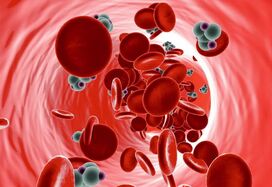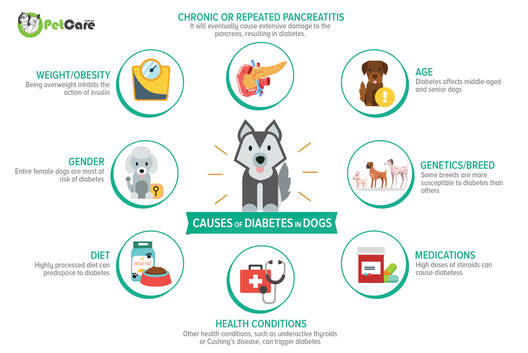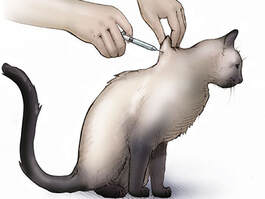 Diabetes is a disease that is familiar to us as humans, but how much do we think about diabetic dogs? What about diabetic cats? This disease has been increasing in prevalence for both dogs and cats, although dogs are more prone to getting diabetes than cats. This blog post will discuss the nature of diabetes, how it affects dogs and cats, and treatment options for a diagnosed pet. To understand how diabetes is diagnosed, it is important to understand a little bit about the system involved with the disease. Diabetes mellitus is a disease where the glucose levels in the blood are elevated to dangerous levels. Glucose is the main energy molecule used by cells in the body, and it is taken up by cells as it passes through the bloodstream. In order to be taken up by the cells, glucose needs another molecule, insulin, to tell the cells to take up the glucose. In this way, glucose can be managed by the body as to where and when it gets taken up. There are two types of diabetes: Type I and Type II. Type I diabetes is where the pancreas, which produces insulin, is damaged or is malfunctioning and does not produce enough insulin for the body. This type of diabetes is most common in dogs. Type II is where the body does not respond appropriately to insulin. This is the most common type of diabetes in cats, although it is somewhat rare for a cat to get diabetes (less than 1% of cats are diagnosed with it). Both of these types of diabetes provide problematic situations for your pet; The cells do not absorb the glucose they need to fuel cellular processes, and the bloodstream cannot get rid of the glucose present. Glucose can then rise to toxic levels in the blood, which can lead to kidney, eye, heart, and nerve problems.  When a pet has diabetes, there are some clinical signs you can look for that may be a concern to bring up with your veterinarian. Some of the major signs are: -Excessive thirst -Increased urination -Unexplained weight loss -Increased appetite Lethargy and disinterest in activities may also be advanced symptoms of diabetes. With these clinical signs, they all tie into the body trying to get rid of the excess glucose in the blood, or showing adverse effects from not being able to use glucose that is present in the blood. The thirst is due to your pet urinating more, and the weight loss and increased appetite is from the cells not being able to grab the nutrients they need. Urinating more allows the body to dispel waste from the body, including excess glucose. The increased appetite can be misleading, as you may think your pet is starving and will want to feed him/her more food. In reality, this will only increase glucose levels in the blood, which can be dangerous, without providing much as far as nutrition goes because of the reduced amount of glucose being taken up by the cells.  There is no cure for diabetes, although there are many ways to improve your pets quality of life when it has been diagnosed with diabetes. Insulin injections are the most typical way of managing diabetes, and there are a wide variety of brands and insulin, each with their own pros and cons. Insulin injections are useful and common for managing your pets diabetes, and you can discuss with your veterinarian how to best manage your pet's diabetes. You can also check the blood glucose levels of your pet with a glucometer, a machine that checks glucose levels. It can be intimidating at first, but with a little practice and guidance from your veterinarian, it is an easy way to monitor how your pet is doing, giving you information to make a plan with your veterinarian to create a dose and plan catered specifically to your pet. Dietary management is important in maintaining weight for your pet. It is important to keep in mind that although your pet may have a larger appetite, the cells are not getting the glucose they need to function efficiently, and that will cause weight loss. A low carbohydrate diet may be prescribed by your veterinarian, which has been shown to help manage glucose blood levels better. Always follow your veterinarian's guidance on how diet is to be implemented in your pet's health plan. Diabetes is a disease that can be confusing for pet owners, and it is important to educate yourself as much as you can when your pet is diagnosed with diabetes. It may seem impossible to work with, but many pet owners are successful in giving their pets the best quality of life they deserve. Diabetes, although incurable, can be well managed with insulin, dietary management, and love from owners like you. With a little love and effort, your pets can live wonderful, fulfilling lives. Helpful Links: https://www.vet.cornell.edu/departments-centers-and-institutes/cornell-feline-health-center/health-information/feline-health-topics/feline-diabetes https://www.akc.org/expert-advice/health/diabetes-in-dogs/
50 Comments
|
Author:NOAH Staff Archives
April 2022
|